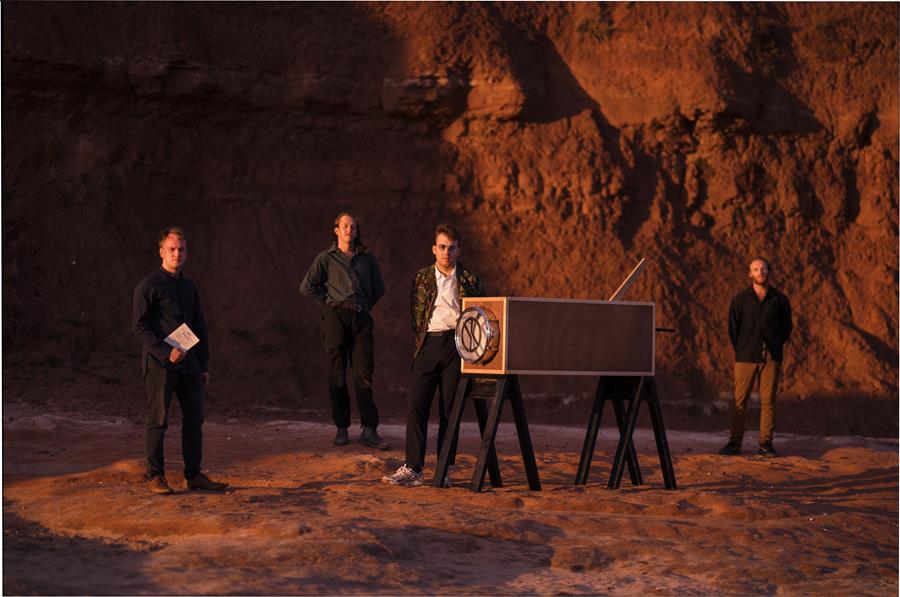LICE aren’t so much a band, per se, as a dynamic movement within left-field arts.
A collective of Bristolian minds who match music to prose while crafting their own instruments, they recently inaugurated their very own label – Settled Law Records – as a platform for fellow experimentalists.
New album ‘Wasteland: What Ails Our People Is Clear’ is out now, and it’s a remarkable listen.
Often pegged as post-punk, their ability to blow apart preconceptions places them in a lane of their own.
Alongside the new album LICE spent two years crafting experimental short fiction to compliment their work, and there’s a heady, literary edge to their lyrical word flow.
Clash sat down with Alastair Shuttleworth to discuss literary influences in Their Library…
– – –
– – –
What is your favourite book and why?
My favourite novel is Kurt Vonnegut’s The Sirens Of Titan.
Aside from his use of humour to make compelling (and heart-breaking) statements about the ‘usefulness’ of life, I think Vonnegut’s genius here lies in the brevity he affords his really good ideas – of which there are a constellation.There’s a three-page aside in which he casually explains that Stonehenge was built by humans under the telepathic influence of a distant planet, just to send reassuring messages to a robot stranded in a broken ship on Mars; viewing Stonehenge from above, the robot reads the arranged shapes in his home planet’s language as ‘the parts are on their way’.
It helped teach me that important arguments don’t need to be presented through stern, didactic realism: there’s plenty of space for playfulness in making points.
What other authors do you like?
I generally point to William Burroughs and Brian Catling, but there are loads of writers that I love deeply: Margaret Atwood, Alan Moore etc. A new author I’ve discovered this year is Sam Tallent, with whom LICE have since struck up a friendship. He’s a comedian from Denver, who published a really brutal novel about the stand-up circuit this year called Running The Light.
What draws you to certain books?
Books that end up being important to me often seem to show up without me looking for them. I came across Brian Catling’s The Vorrh through an article John Doran wrote for LUSH (bizarrely) about multidisciplinary artists, and I came across Sam Tallent’s Running The Light because Doug Stanhope mentioned it on his podcast. I love storytelling with humour, inventiveness and extremity, but I’m also drawn to obscure subjects: I read Moby Dick this year, and found the passages dealing with the ridiculous minutiae of whaling (storing blubber etc.) completely magnetic.
Have you ever discovered a real lost classic? What is it and why?
The little-known autobiography Memoirs Of A Bullfighter by Conchita Cintron. This is a subject on which I have moral objections, but about which I also knew nothing. It is a fascinating, rattling piece of work; the psychological and physical experiences of bullfighting are presented in captivating detail. Cintron’s prose is beautiful, and her rise to international celebrity is a remarkable story.
Do your literary influences have a direct impact on your songwriting?
Enormously. The lyrical experiment of WASTELAND: What Ails Our People Is Clear emerged from a desire to pair my love of science-fiction with my interest in the violent polemics of early European avant-garde art movements. The way my characters argue is rooted in my research into the Italian Futurists and Vorticists, with the pamphlet’s cover being modelled on BLAST.
My reading at times influenced WASTELAND’s content directly, with Dr Coehn’s proposal in ‘R.D.C.’ basically paraphrasing sections from Louis Althusser’s Ideology and Ideological State Apparatuses. It also influenced my formal experiments, from the vignette structure (drawn from The Naked Lunch) to the setting’s two-part construction and dissolution, inspired by Wyndham Lewis’ unstageable play ‘Enemy Of The Stars’.
What are you reading at the moment?
I’m currently reading a collection of essays on Futurism entitled Back To The Futurists, but I’ve also just started on a copy of Selected Poems by Linton Kwesi Johnson, of whom I’ve become a big fan over the past year.
What is the first book you remember reading as a child?
My earliest memory of reading is a book about dinosaurs, when my mother was teaching me.
Did you make good use of your library card as a child / teenager?
When I was very young, I was one of those kids that was constantly reading Goosebumps or Darren Shan books – generally from a local library my parents took me to. When I think about that now, my ‘grown-up’ literary interests (blackly-comical, grotesque sci-fi) seem completely predictable. I more or less went off reading for pleasure in my teenage years until I was 16, when my English teacher Mr. Walters gave me this big stack of books that were gathering dust in the department from past courses. I spent the summer reading them, and discovering some classics (Crime & Punishment, Wuthering Heights, The Metamorphosis) which got me back into it.
How do you think literature achieves timelessness?
I think the timelessness of literary works lies in how enduringly compelling they are to draw interpretations from. When I think about the early experiences that made me want to pour myself into literature, they were all to do with thinking about reading books as a creative process in itself. That’s not to say timelessness is reserved for esoteric or allegorical books, as – regardless of the path I took on WASTELAND – I don’t think fiction needs to be ‘difficult’ to render interesting readings.
I mentioned this question to LICE’s guitarist Silas, who suggested literature might achieve timelessness when it exposes (whether deliberately or accidentally) hidden assumptions of the dominant ideology.
Do you read book reviews? I follow a few science-fiction blogs, which I find useful as a resource.
Would you ever re-read the same book?
I rarely do, but it always turns out to be worthwhile. Aside from re-reading favourites, at University I ended up having to revisit a few books I read when I was younger: Heart Of Darkness, A Clockwork Orange etc. In the same way as an album, I think it’s easier to enjoy a book when you’re already sold on it.
Have you ever identified with a character in a book? Which one and why?
Upon first reading William Burroughs’ The Place Of Dead Roads, I remember being especially drawn to Kim Carson, ring leader of ‘The Wild Fruits’: a circle of “flamboyant and picturesque outlaws”, including ‘The Blind Gun’ who zeroes in with bat squeaks and ‘The Priest’ who goes into battle giving his adversaries the last rights. Kim is a destructive character and hardly sympathetic, but one in whom I see some of my lesser qualities at times: my interest in grotesques, my streak of self-importance etc. I had this character in mind when I created WASTELAND’s protagonist The Conveyor, who I suppose is more myself than anything else.
On reflection, Kim’s relationship with ‘The Wild Fruits’ (certainly in their introduction) isn’t too dissimilar to that which I suppose I feel with my characters: a sort of chaotic, colourful circle of recruits in whatever I’m trying to do.
Do you read one book at a time or more than one?
I increasingly find myself reading non-fiction alongside fiction: I recently ended up reading The Origin Of Species while I was still finishing Moby Dick (no connection).
Silas has become very interested in an intersection of economics and philosophy over the past year or so, and has furnished me with a few texts on the subject including Quinn Slobodian’s brilliant (if deeply disheartening) Globalists: The End of An Empire and The Birth of Neoliberalism. He would like to recommend The Philosophy Of Praxis by Andrew Feenberg to your readers, in particular for its exploration of Lukács’ theory of Reification (discussed here).
Is there an author / poet you would like to collaborate with?
I’d love nothing more than the chance to speak with and learn from some of my living heroes (Alan Moore, Margaret Atwood, Paul Muldoon, Brian Catling etc.), but I’ve got no idea how I’d work with them.
My process is spending hours and days shuffling sentences around on MS Word, and the lyrics to most tracks from this album ended up with distinct drafts in the double-figures. WASTELAND is pretty wild, but if somebody was in the room when I was writing it, they’d find it agonising.
– – –
‘Wasteland: What Ails Our People Is Clear’ is out now.
Photo Credit: Rowan Alfred

